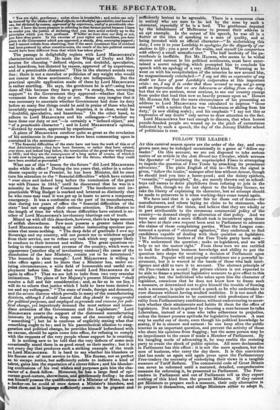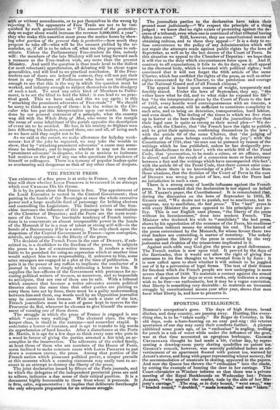FOLLOW THE LEADER!
AT this carnival season sports are the order of the day, and ever/- grown men may be indulged occasionally in a game at "follow my leader." On this account, we are not disposed to take serious notice of an article in the Anti Bread-tax Circular, which accuses the Spectator of "imitating the unprincipled Times in attempting to impede the question of Free Trade by attacking its prominent advocates." The plain English of this is—When the signal is given, "follow the leader," scamper after him without demur, though he should lead you into a horse-pond ; and the dainty epithets, "versatile,"" unprincipled," &c., are merely thrown out as school- boys call names to deter playfellows from refusing to join in the game. But, though we do not object to the holyday licence, we take the liberty of explaining its character, lest an attempt should be made to persevere in it when working-days come round again. We have said that it is quite fair for those out of doors—for- manufacturers, and others laying no claim to be statesmen, who feel the pressure of the times, and believe that they are wholly or in part attributable to the erroneous commercial policy of the country—to demand simply an alteration of that policy. And we have also said that a more difficult task is incumbent upon those who have at their own request been sent to Parliament to advocate the claims of these complaining parties. When the League com- menced a system of " electoral agitation," they undertook to find candidates capable of dealing with their question as legislators. The Parliamentary leaders of the Free Trade party have said- " We understand the question ; make us legislators, and we will help to set the matter right." From these men we are entitled to look for sufficient business knowledge and ability to put the question into shape for receiving a decision of Parliament upon its merits. Popular will and popular confidence are a powerful in- strument, but it is wasted in the hands of those who lack intel- ligence and skill to turn it to account. The abstract principle of the Free-traders is sound : the private citizen is not expected to be able to frame a practical legislative measure to give effect to this principle; but the individual who takes upon him the character of legislator, conscious that he does not know how to frame such a measure, or determined not to give himself the trouble of framing such a measure, is quite as much a quack as he who undertakes to cure diseases without having studied medicine. It is too much the custom of constituencies to be contented with professions of libe- rality from Parliamentary candidates, without endeavouring to ascer- tain whether their attainments and habits fit them for the office of legislators. Not much is gained by choosing a man because he talks Liberalism, instead of a man who talks adherence to prejudice, unless the former possess aptitude for legislative business. A man may be useful out of doors, even though his political knowledge be scanty, if he is sincere and earnest : he can keep alive the public interest in an important question, and prevent the activity of those who share his opinions from flagging; but the same person may be an impediment to the cause if made a Member of Parliament. By his bungling mode of advocating it, he may enable the resisting party to evade the shock of public opinion. All mere declamation in Parliament has this effect : it is not the mere speakers, but the men of business, who carry the day there. It is this conviction that has made us again and again press upon the Parliamentary Free-traders the necessity of embodying their views in a tangible measure of Tariff Reform. The commercial code of Great Britain can never be reformed until a matured, detailed, comprehensive measure for reforming it, be presented to Parliament. The Free- traders in Parliament and out of Parliament tell us they expect nothing of this kind front the present Ministers. If they cannot get Ministers to prepare such a measure, their only alternative is to prepare it themselves, and oblige Ministers either to adopt it, Atrith or without amendments, or to put themselves in the wrong by rejecting it. The opponents of Free Trade are not to be van- quished by such generalities as " The removal of Me protective- duty on sugar alone would increase the revenue 3,000,000/. a year": they who make this assertion must press the matter home by show- ing what portion of Me present duty is protective—how much they propose to take off—what will be the amount yielded by the re- mainder, or, if all is to be taken off, what tax they propose to sub- stitute. Unless the Parliamentary Free-traders do this, nobody will : the members of the late Ministry will not bring forward such a measure as the Free-traders wish, any more than the present Ministry. And until the question is thus made level to the dullest (or most reluctant) apprehension, all debating will be about vague generalities, and will lead to no practical conclusion. If the Free- traders out of doors are indeed in earnest, they will not put their trust in any Members of Parliament who have not intelligence enough to see that this is the way in which the question 'must be worked, and industry enough to subject themselves to the drudgery of such a task. To send any other kind of Members to Parlia- ment, is to set the blind to lead the blind : it can lead to no prac- tical good. This we have said, and this we say again : is this "attacking the prominent advocates of Free-trade" ? We should be sorry to think so meanly of them : it is the writer in the Cir- cular who has put this interpretation upon our words. He has done by our general statement of a principle, what the country wag did with the Whole Duty of Man, who wrote in the margin the name of some inhabitant of the parish opposite the description of every sin to be avoided. He has, in his anxiety to frighten men into following his leaders, accused them, one and all, of being such as we have said they ought not to be. As we said at the outset, we make allowance for holyday weak- nesses: but if the joke be repeated, we may take the trouble to show, that by "attacking prominent advocates" a cause may some- times be benefited ; and to inquire whether it may not be some "prominent advocate" in disguise, who is so anxious to insinuate bad motives on the part of any one who questions the prudence of himself or colleagues. There is a tyranny of popular leaders quite as overbearing and dangerous as that of any other class of despots.
































 Previous page
Previous page